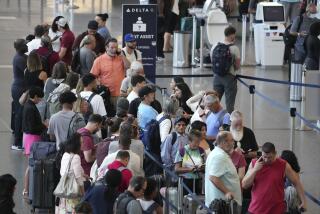Delta Adds Fee to Tickets Not Bought Online
- Share via
Delta Air Lines, looking to save money by pushing more travelers to make online reservations, has quietly imposed a $2 surcharge on round-trip domestic tickets not purchased through its Web site. No other major U.S. carriers Wednesday followed suit.
Effective immediately, every Delta passenger who books a flight through a travel agent, through a Delta representative over the phone or at a ticket counter, or through any other Web site, will be paying more to travel within the U.S. than those who go to Delta’s site.
Atlanta-based Delta, the nation’s third-largest airline, joins a growing number of traditional businesses that are hoping to boost electronic commerce--and at the same time cuts costs--by luring customers with discounts and other incentives. Already, a number of banks and brokerages encourage online transactions by offering them for free or at a discount compared with phone or in-person service. Delta, however, appeared to be the first to add a surcharge for non-Internet transactions.
But Delta’s move, which was not publicized but was posted Monday on the computer reservations systems used by travel agents, was criticized by consumer advocates and others who called it a penalty for the majority of travelers.
Only about 2% of Delta’s 105 million passengers last year booked their flights directly through its Web site, the airline said.
“There’s no way the consumer can get access to comparative information through Delta’s Web site,” said James Ashurst, a spokesman for the Arlington, Va.-based American Society of Travel Agents. “Online lookers have not equaled online bookers as quickly as airlines would like. Instead of incentifying for booking via the Net, they’re penalizing consumers who don’t.”
Carol Kaminski, managing editor of Best Fares magazine, said she expects most large airlines to follow suit. “I would be amazed if everyone didn’t follow them except for Southwest,” she said.
“We prefer booking incentives,” Kaminski said, citing the double frequent flier miles, inexpensive companion fares and other perks most airlines offer travelers who book online. “Don’t force consumers.”
United, American Airlines, Continental and US Airways have no surcharge similar to Delta’s.
Delta would not comment Wednesday on the surcharge. But in its message to travel agents, the airline cited soaring costs for selling tickets through conventional means as the reason for the added fee. Delta said these costs, which include travel agent commissions, computer reservation systems fees and credit card charges, totaled more than $1 billion in 1998.
Northwest Airlines, which said it has no plans in the near future to add a surcharge, was sympathetic to the issue of rising distribution costs.
“It is more expensive when we have the overhead costs associated with paying the travel agent commissions or selling tickets when we use phone time or people time,” said Northwest spokeswoman Marta Laughlin. “That’s just inherent. When you have cost increases, you have to look at the entire pie and see how you’re going to manage.”
Trans World Airlines spokesman Jim Brown said recent caps on travel agents’ commissions have caused a drop in distribution costs at TWA.
“We’ve seen a fairly steady decrease in distribution costs because of the change in commission structure,” he said. In the third quarter of 1998, TWA spent $48.6 million on travel agents’ commissions. One year earlier, before the caps, the airline had spent $65.9 million during the same three-month period.
Delta posted lower commission fees for the nine months ended Sept. 30. But Delta said that since 1990, computer reservation system booking fees have increased more than 280%, compared with revenue growth of 50%.
About 35 million Americans have made airline reservations online, according to a 1998 study by Phoenix-based PhoCusWright.
More to Read
Sign up for The Wild
We’ll help you find the best places to hike, bike and run, as well as the perfect silent spots for meditation and yoga.
You may occasionally receive promotional content from the Los Angeles Times.







